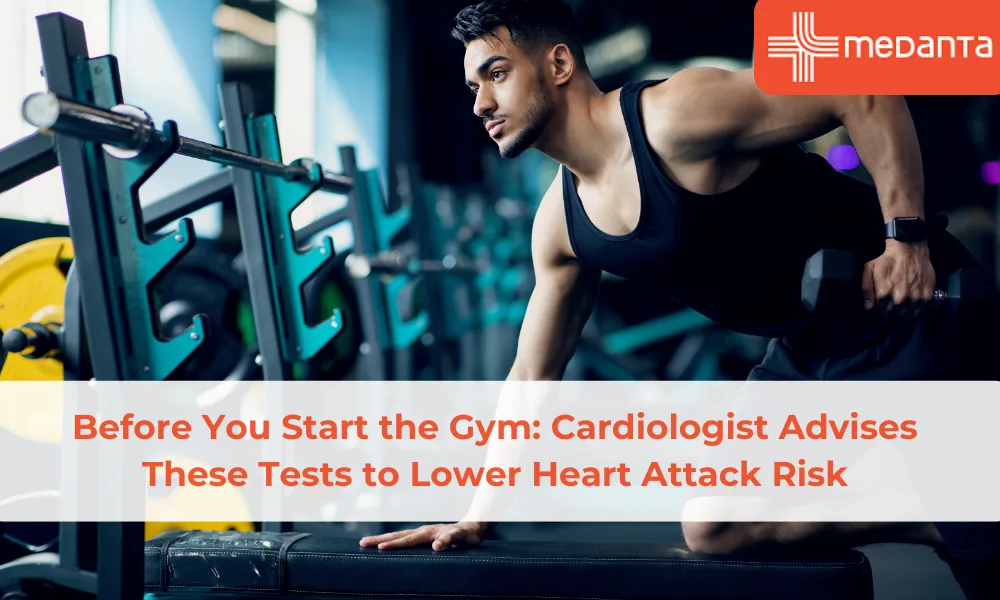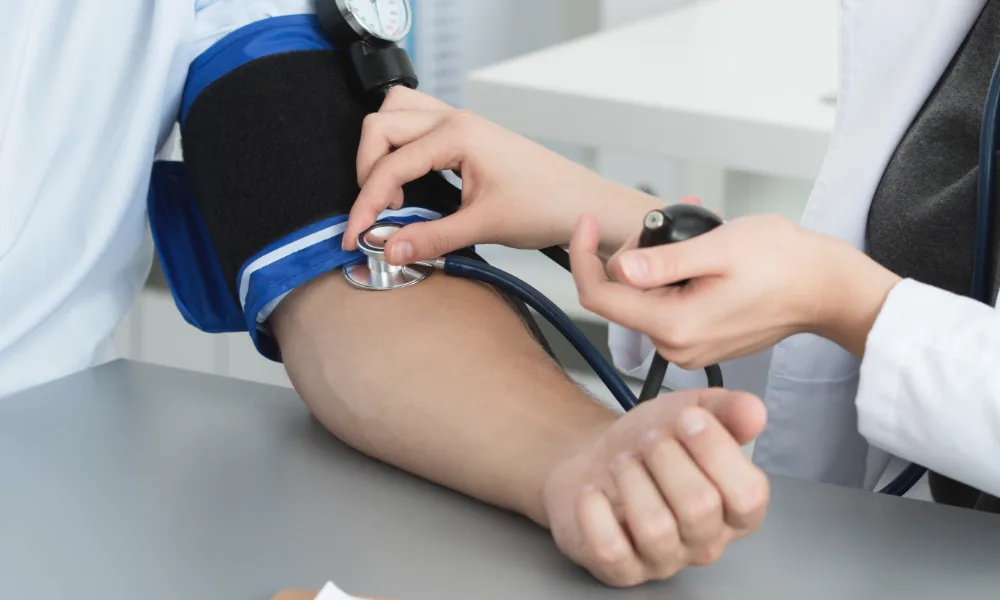Before You Start the Gym: Cardiologist Advises These Tests to Lower Heart Attack Risk

TABLE OF CONTENTS
Young adults experiencing heart attacks at gyms have become a common occurrence over the last several years. News headlines frequently feature these incidents. People's growing enthusiasm for fitness shows they care about their health. But this trend has a darker side. Young and seemingly healthy people face sudden cardiac arrest during their workouts more frequently now.
Why Gym Workouts Can Stress the Heart
Heart attacks at gyms happen due to several reasons. Blood pressure can spike sharply if you don't ease into heavy exercise gradually. Hidden heart problems are the biggest reason for cardiac emergencies at the gym. Research shows that many heart attacks happen to people under 40. This number keeps growing because of bad diets, stress and health conditions like diabetes. On top of that, genetic conditions like hypertrophic cardiomyopathy make heart muscles thicker and remain the main reason young athletes die suddenly from heart problems.
Why Tests Matter Before You Hit the Gym

Medical tests are crucial if you plan to begin a fitness experience, especially when you have a family history of heart disease or are over 30. These health screenings can reduce your risk of heart attacks and prevent tragic outcomes during what should be a healthy activity.
Heart and Health Tests to Do Before High-Intensity Gym Training
Medical tests could save your life before you start lifting weights. These screenings become crucial if you're over 30, have heart issues in your family, or plan to begin a new fitness routine.
A. Blood Pressure Testing:
Checking blood pressure prior to gym workouts helps avoid heart problems. Many individuals might not know they have high blood pressure, and heavy exercise puts extra stress on the heart. Discovering hypertension lets doctors recommend safe exercise levels to lower the risk to the heart and stop issues like heart attacks or strokes during workouts.
B. Blood Analysis (Cardiac Biomarkers, Inflammatory Markers, Lipid Profile, HbA1c / Blood Sugar Tests) :
Blood tests allow doctors to find inflammation markers, high cholesterol, and uncontrolled diabetes—key factors that lead to heart disease and stroke.
Your blood tests should include:
Troponin and NT-proBNP to detect cardiac strain
Lipid Profile and HbA1c to measure cholesterol and long-term blood sugar
hs-CRP to spot heart-related inflammation
Complete Blood Count to check overall health
Thyroid Function Tests to assess metabolism
C. Electrocardiogram:
Your heart's baseline check starts with an ECG (Electrocardiogram). This quick and simple test captures your heart's electrical signals to spot any abnormalities that could cause sudden cardiac failure.
D. Echocardiography:
A 2D Echo also known as Echocardiography, uses ultrasound to display your heart while it works. This test helps find cardiac structural issues like valve defects or hypertrophic cardiomyopathy that might otherwise go unnoticed.
E. Treadmill Test:
The Treadmill Test (TMT) checks how your heart handles stress during exercise. This test identifies blocked arteries or blood flow problems that only appear during exercise.
These screenings are not just extra steps. They play a role in confirming your workouts build your strength without putting your heart at risk.
These combined evaluations help doctors:
Compare your heart's performance to others in your age group
Check if your current treatments work effectively
Design exercise plans that match your heart's strength
Doctors emphasise that these tests are life-saving. If you're over 30, push yourself hard in the gym, or have a family history—please, get checked first.
How These Tests Help Prevent Gym-related Heart Attacks
Doctors use these tests to find hidden heart problems that do not cause symptoms in regular life but may turn risky during intense exercise. By assessing heart health before starting or continuing a gym routine, they ensure your heart is strong enough for physical exertion and help prevent sudden cardiac events or exercise-related heart attacks.
Conclusion
A fitness experience improves your overall health, but the increasing cases of gym-related cardiac emergencies show that you just need to be careful. Medical screenings before intense workouts could save your life. A basic ECG, treadmill test, or blood work might reveal hidden dangers in seemingly healthy people. Your heart needs this protection. These screenings do more than identify risks - they create a roadmap for safe physical activity that matches your body's capabilities.
Fitness should make you stronger, not put your health at risk. Regular exercise improves heart health, but jumping into intense workouts without a full picture can put dangerous strain on your heart. Recent tragic events show how sudden cardiac problems can affect anyone, whatever their age or fitness level.
You can take control of your health right now. Talk to your doctor about proper screenings before heading to the gym. The goal of exercise is to live healthier - make sure you're here to enjoy the results of your hard work!
FAQs
Is the gym safe for people with mild BP or cholesterol?
Yes, doing exercise helps keep mild blood pressure and cholesterol levels in check. You should start slow and follow proper advice. Begin with easy activities like walking or gentle cardio, and raise the intensity step by step. Talk to your doctor first before starting any exercise plan. They can give tips that fit your health conditions and any medications you are taking.
Can beginners skip medical tests?
No, skipping health checks is not a good idea for beginners if you are over 30 or have risks like family heart issues, diabetes, or weight problems. A basic check-up can catch health concerns so you can exercise. Even young and healthy people can gain from a basic health check to set safe workout limits and avoid any risks.
What's the safest way to start strength training?
Begin with exercises that use your body weight and start with light weights. Pay close attention to getting the technique right instead of trying to lift something heavy. Work out two or three times and let your muscles recover on the other days. Ask a trained professional to help you learn proper methods. Over six to eight weeks, increase the weights and push yourself harder. Pay attention to your body and stop exercising if you feel chest pain, lightheadedness, or have trouble breathing.
How soon can results appear after joining a gym?
Energy levels and mood can start to improve after about 1 to 2 weeks. Physical changes take longer showing up after 4 to 6 weeks of steady workouts. Strength tends to build between 8 and 12 weeks of regular training. Getting long-lasting results takes both time and effort.
Why do heart attacks happen during workouts?
Heart attacks during a workout happen because of hidden coronary artery disease. Hard exercise can cause plaques in narrow arteries to rupture, which may block blood flow suddenly. Pushing beyond your fitness level, getting dehydrated, working out in extreme heat, or exercising while sick might also cause problems.
Which heart tests should I take before joining a gym?
Doctors often recommend:
Basic blood tests like checking cardiac biomarkers, inflammatory markers, lipid profile and HbA1c or blood sugar levels
Monitoring blood pressure
Electrocardiogram
Trademil test
2D Echocardiography
Is joining a gym safe after a heart check-up?
You can exercise after having a routine heart check, and many doctors suggest this. They offer guidance based on your results like, suggested heart rate zones and workout intensity. Stick to what your doctor recommends regarding how often, how long, and what type of exercise you should do. Keeping track of your progress through regular check-ups ensures you stay safe while building your fitness over time.
Can young people have heart attacks at the gym?
Nowadays, young people are also facing heart issues during intense workouts. This happens because of hidden conditions like hypertrophic cardiomyopathy or irregular heart rhythms. Chest pain, extreme shortness of breath, dizziness or fainting while working out are warning signs to watch for. Young athletes need proper check-ups if there's a family history of heart problems or sudden cardiac death.
How often should I get my heart checked if I'm a regular gym-goer?
If you hit the gym often, it's a good idea to get your heart checked out once a year, or more if your doctor says so. This is true if you're over 30 or do intense workouts. Regular check-ups can help monitor your heart health and adjust your fitness routine as needed.






